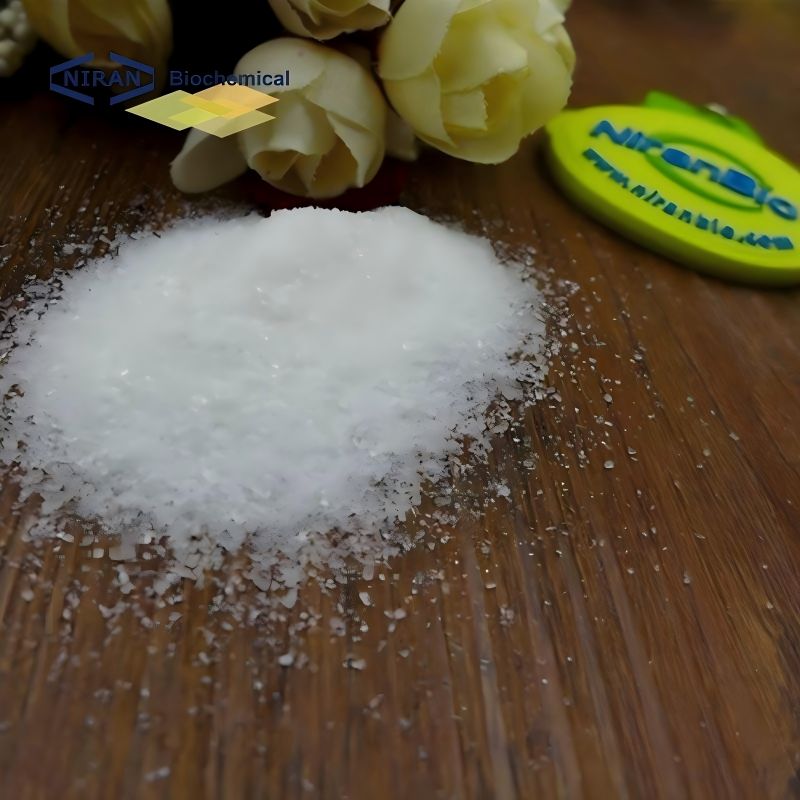Acesulfame Potassium, commonly referred to as Ace-K, is a highly popular artificial sweetener widely used in sugar-free and low-calorie products. With its calorie-free sweetness and excellent stability, Ace-K has become a staple in various food and beverage industries.
The rise of health-conscious consumers, coupled with increasing concerns about sugar consumption, obesity, and diabetes, has driven the demand for sugar alternatives like Ace-K.
This article provides a comprehensive overview of Acesulfame Potassium, covering its benefits, safety, and applications, and shedding light on its role in today’s food industry.

What is Acesulfame Potassium?
Acesulfame Potassium is an artificial sweetener that is free of calories and calories, with a sweetness level of about 200 times that of sugar. It technically falls under the sulfamate class of compounds.
Its chemical structure consists of a potassium salt bonded to acetoacetate, making it soluble in water and stable across a wide range of temperatures and pH levels. Unlike some sweeteners, Ace-K does not break down in heat, making it ideal for use in cooking and baking.
Discovery and Approval
Acesulfame Potassium was discovered in 1967 by German chemist Karl Clauss while working for Hoechst AG. Initially, food makers seeking sugar substitutes found it to be a desirable alternative due to its strong sweetness and durability.
Following rigorous testing, Acesulfame Potassium was approved by the U.S. Food and Drug Administration (FDA) in 1988 for use in specific food and beverage products, including baked goods and soft drinks.
Over time, its approval expanded, and it has since been recognized as safe by other regulatory bodies such as the European Food Safety Authority (EFSA) and the World Health Organization (WHO).
How It Works
Acesulfame Potassium works by stimulating the sweetness receptors on the tongue, much like sugar. However, it passes through the body without being metabolized, meaning it provides sweetness without any caloric impact. Its strong sweetness means that little is needed to have the right flavor. This calorie-free property makes Ace-K a valuable tool in developing low-calorie or sugar-free products.
Benefits of Acesulfame Potassium
Calorie-Free Sweetness
One of the most significant advantages of Acesulfame Potassium is that it provides sweetness without adding any calories. As concerns about obesity and diabetes continue to grow, Ace-K offers an alternative to sugar that allows consumers to enjoy sweet-tasting foods and beverages while maintaining a low-calorie diet. This makes it the go-to option for people who want to cut less sugar without compromising flavor.
Heat Stability
Unlike some other artificial sweeteners, Acesulfame Potassium remains stable at high temperatures. Because of this, it works perfectly in baked items, canned goods, and even hot beverages.
On the other hand, aspartame and other sweeteners have a limited shelf life because of their tendency to break down when heated. Ace-K’s stability ensures that products retain their sweetness even after cooking or baking, making it a versatile sweetening option across different culinary contexts.
Mixes with Additional Sweeteners
Acetosulfame To achieve a more balanced and sugar-like flavor, potassium is often coupled with other artificial sweeteners, like aspartame and sucralose. Manufacturers can counteract any aftertaste that some sweeteners might have by blending them.
For example, Ace-K’s slight bitterness can be masked when paired with aspartame, resulting in a more pleasant flavor profile. This versatility has made it a key ingredient in the formulation of soft drinks, candies, and sugar-free snacks.
Dental Health Benefits
Acesulfame Potassium does not contribute to tooth decay, unlike sugar, which promotes bacterial growth that leads to cavities. This makes Ace-K a safer option for oral health. It is commonly used in sugar-free gums, mouthwash, and toothpaste due to its non-cariogenic properties, ensuring consumers can enjoy sweetness without compromising their dental health.
Safety of Acesulfame Potassium
Regulatory Approvals
Acesulfame Potassium has undergone extensive safety testing and is approved for use by major health authorities worldwide. To guarantee its safety, extensive investigations have been carried out by the FDA and the EFSA.
The Joint FAO/WHO Expert Committee on Food Additives (JECFA) also conducted an evaluation, concluding that Ace-K is safe for consumption when used within acceptable limits. Its regulatory approval spans more than 100 countries, further solidifying its safety record in food and beverage applications.
Acceptable Daily Intake (ADI)
The Acceptable Daily Intake (ADI) for Acesulfame Potassium is set at 15 mg per kilogram of body weight. This ADI shows how much can be consumed daily for the rest of one’s life without causing harm to one’s health.
For context, a person weighing 70 kg (154 lbs) would have an ADI of 1,050 mg per day. Most people’s daily intake of Ace-K, even those consuming a significant amount of sugar-free products, remains well below this level. In real-world consumption patterns, the average intake is typically far below the ADI, ensuring safety for the general population.
Scientific Research
Despite some initial concerns regarding artificial sweeteners and their possible link to cancer, scientific studies have found no evidence that Acesulfame Potassium poses any cancer risk when used within approved limits.
The National Toxicology Program (NTP) and European Food Safety Authority (EFSA) have both conducted long-term studies and found no significant health risks associated with Ace-K. These findings align with a large body of research that supports the safe use of Ace-K in food and beverages.
Long-Term Safety
Numerous studies have looked at the long-term safety of Acesulfame Potassium, particularly its impact on metabolism, cancer risk, and neurological function. To date, no evidence suggests that Ace-K has any adverse long-term effects when consumed within the recommended limits.
In fact, it has been shown to pass through the body unchanged, with no accumulation in tissues, making it a safe and effective sweetener for regular consumption.
Common Uses of Acesulfame Potassium

Food and Beverage Industry
Acesulfame Potassium is widely used in the food and beverage industry, especially in products marketed as sugar-free or low-calorie. Common examples include:
- Diet soft drinks and sodas
- Sugar-free candies and chewing gum
- Low-calorie desserts such as puddings, gelatins, and ice creams
- Baked goods like cookies and cakes
- Sauces, dressings, and condiments
Its stability under various conditions, combined with its ability to retain sweetness even in acidic or heated environments, makes it ideal for a wide range of applications.
Pharmaceutical Industry
In the pharmaceutical industry, Acesulfame Potassium is used to improve the taste of medicines, particularly in chewable tablets, syrups, and oral suspensions. Its sweetness helps mask the bitterness of active pharmaceutical ingredients, making the medication more palatable without the addition of sugar.
Personal Care Products
Beyond food and beverages, Acesulfame Potassium is also found in personal care products like toothpaste and mouthwash. As it does not promote cavities, it is often used as a non-cariogenic sweetener in products that require sweetness without the negative effects of sugar.
Acesulfame Potassium vs. Other Sweeteners
The table below compares Acesulfame Potassium with other popular artificial sweeteners like Aspartame, Sucralose, and Stevia, highlighting their key differences in heat stability, taste, caloric content, and common applications.
| Sweetener | Heat Stability | Taste | Calories | Common Uses |
| Acesulfame Potassium | Stable at high temperatures | Slightly bitter on its own; blends well | 0 calories | Baked goods, soft drinks, sugar-free candy |
| Aspartame | Degrades at high temperatures | Sweet but unstable when heated | 4 calories/gram (in small amounts) | Soft drinks, gum, sugar-free products |
| Sucralose | Stable at high temperatures | Sweet without aftertaste | 0 calories | Baked goods, sauces, soft drinks |
| Stevia | Stable but can have an aftertaste | Natural, sweet, sometimes a slight aftertaste | 0 calories | Beverages, desserts, natural food products |
Future of Acesulfame Potassium and Sweeteners
- Trends in Artificial Sweeteners: As consumers continue to prioritize health and wellness, the demand for artificial sweeteners like Ace-K is expected to rise. With growing awareness of the harmful effects of excessive sugar consumption, more individuals are shifting toward sugar-free and low-calorie diets, increasing the need for effective sugar substitutes.
- Market Growth: Over the next few years, Ace-K and the artificial sweetener market are expected to see substantial expansion. As manufacturers seek to meet the demand for healthier alternatives, Acesulfame Potassium is likely to play an increasingly important role in food innovation. Its ability to blend with other sweeteners and retain its sweetness under heat makes it a highly sought-after ingredient in product formulations.
- Sustainability and Innovation: With sustainability being a key concern across industries, manufacturers are also focusing on improving the environmental impact of sweeteners like Ace-K. Innovations in production processes aim to reduce waste and improve efficiency. As the market evolves, we may see further developments that enhance the sustainability and taste profile of artificial sweeteners.
Conclusion
Acesulfame Potassium is a versatile, safe, and widely used artificial sweetener that provides calorie-free sweetness across a range of food, beverage, and personal care products. Its ability to remain stable under heat and acidity, combined with its compatibility with other sweeteners, makes it an essential ingredient in the modern food industry.
As health-conscious consumers continue to seek sugar alternatives, Ace-K will likely play an even greater role in the future of low-calorie and sugar-free products.
